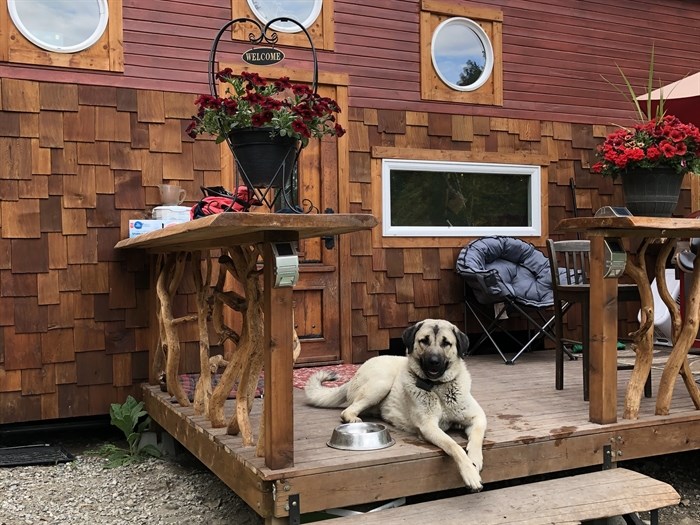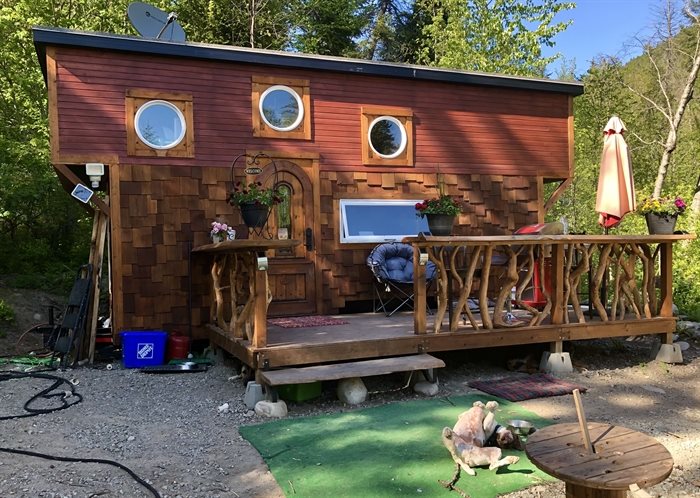Peachland man battling to stay in tiny home facing court, hefty fines

Peachland man Ryan King has 60 days to remove his dwelling from his property or he will face hefty fines and end up in provincial court.
King has been battling the bylaw department in recent years for the right to remain in a home he built on his 12-acre property in 2017.
Three years ago, a neighbour filed a complaint to bylaw about the house. The tiny house on wheels doesn’t qualify as a permanent dwelling, according to municipal and regional district regulations.
King has been getting $100 fines every week or two ever since, but refuses to leave his home. He has a choice to remove everything from the property or to build a house that complies with regulations.
“I don’t think there is a single thing wrong with how I’m living,” he said. “Who am I bothering and what harm am I doing? Bylaw hasn’t come up with an answer.”
The stakes got much higher for King after he gave permission for regional district staff and the Interior Health Environmental Health Officer to come onto the property to view the living conditions two weeks ago.
“They asked questions about my black water and gray water. I run off a compost toilet, I don’t produce black water,” he said. “The gray water drains into the ground but Interior Health said gray water is classified as sewage. All I put down there is water with biodegradable soap.”
Last week King received a Remedial Action Requirement by the district stating his dwelling doesn’t align with the BC Building Code, CSA Safety Standards or Land Use Regulations, and is not a certified tiny home or a CSA classified Recreational Vehicle.
“We are all concerned with the health and safety of you and your environment,” the letter reads. “The wastewater system you are currently using is not permitted in this streamside aquatic protected area.”
According to the letter, provided to iNFOnews.ca, King is required to remove the dwelling by April 30 otherwise he will receive a $1,000 fine from the municipality and King will have to dispute the matter in provincial court.
“It’s 'get my ass out of here or comply,'” he said. “I can either comply and become homeless or take this to the courts which could be time consuming and expensive.”
READ MORE: Short-term rental rules to tighten in West Kelowna
KIng has been pushing for regulations to be revised to allow his dwelling, tiny homes and RVs to be used as homes to help residents survive the affordable housing and homelessness crisis.
“Nothing has come of it (petition) yet, it’s slowly growing, but people are outraged about my scenario,” he said. “I’m trying to look out for the people around me too. We’re in a housing crisis, as long as the place doesn’t look like a wreck, what’s the harm?”
Using RVs as dwellings has been an ongoing point of contention for several years between residents and municipal governments. The provision to use an RV as a temporary building is allowed if a building permit has been issued for a single-family dwelling and if active construction of the dwelling is occurring with footing and foundation already poured, according to the Regional District of the Central Okanagan regulations. Recreational vehicles are defined as those made for temporary accommodation and the land use zoning of a property determines where an RV can be occupied and for how many days of the month.
“All these people are building tiny homes and the second you put it on wheels, you’re building an RV that isn’t provincially certified,” said chief bylaw officer for the district Dan Maja in a recent interview with iNFOnews. “The regulations are there to ensure these dwellings are safe. No one says he (King) can’t live there, we’re asking him to get a building permit and build his home.”
READ MORE: Kelowna working to balance housing needs with heritage conservation
Maja said RVs are built for camping and temporary accommodation. They don’t have thick walls and are usually built out of combustible material. They are hard to douse when on fire because of the propane tanks at the front.
“It’s better to live in a house and build with permits and inspections so it’s safe and people can respond when you have a proper house address.”
READ MORE: Construction well under way for new tiny homes for homeless Kelowna residents
Maja suggested people approach elected officials to ask for changes.
King said he’s been looking at bylaw codes all week and plans to let the district know the situation is going to “turn into a battle.”
“It’s a shitty scenario, to vacate your property in 60 days,” he said. “I’m mulling over what to do. I have a family, a business, my own land, dogs and chickens, where do I go?”
To contact a reporter for this story, email Shannon Ainslie or call 250-819-6089 or email the editor. You can also submit photos, videos or news tips to the newsroom and be entered to win a monthly prize draw.
We welcome your comments and opinions on our stories but play nice. We won't censor or delete comments unless they contain off-topic statements or links, unnecessary vulgarity, false facts, spam or obviously fake profiles. If you have any concerns about what you see in comments, email the editor in the link above. SUBSCRIBE to our awesome newsletter here.








